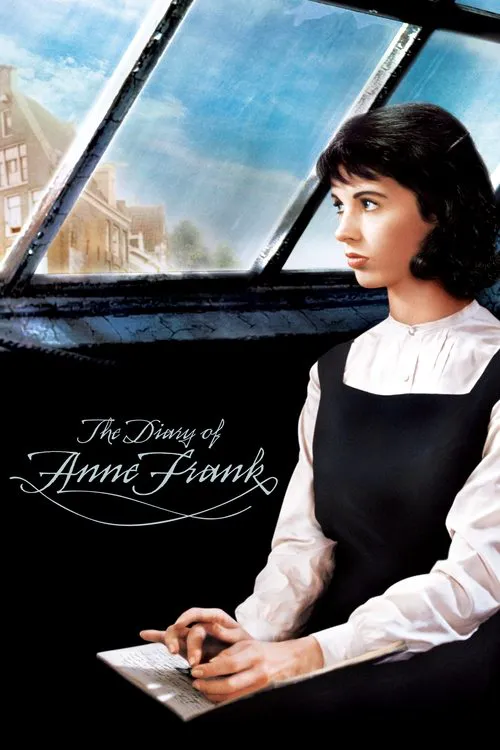The Diary of Anne Frank

Plot
The Diary of Anne Frank, a poignant and powerful film, recounts the true and heart-wrenching story of a young Jewish girl who, amidst the atrocities of the Nazi regime, finds solace in the unbreakable human spirit of hope and resilience. Set during World War II, the movie takes us on a journey into the tumultuous life of Anne Frank, whose courage and innocence in the face of unimaginable adversity continue to captivate audiences worldwide. The film begins in Amsterdam in 1942, where 12-year-old Anne Frank lives with her family: father Otto, mother Edith, and younger sister Margot. Anne, a bright, curious, and creative young girl, keeps a diary chronicling her thoughts, feelings, and experiences, a testament to her vibrant personality and the turmoil she is soon to face. As the Nazi occupation of the Netherlands intensifies, life becomes increasingly difficult for the Franks and their friends. Jews are forced to wear identifying yellow stars, and restrictions on their movements and activities escalate. In July 1942, Anne's father realizes that the family is in grave danger and begins making arrangements to hide them from the Nazi authorities. Otto, well-connected and resourceful, identifies a safe house in an annex above his office, a hidden attic where the Franks and several other Jews can reside in secret. The annex is converted into a cramped yet makeshift home, containing seven people: the Franks, Fritz Pfeffer, a friend of the family, and Hermann van Pels, a dentist who lives with his family. As the Franks settle into their new life, they adopt new identities and routines to maintain the illusion of their non-existence to the outside world. The group works together, sharing responsibilities and supporting each other through the hardships of living in confinement. Otto, a skilled businessperson, becomes the manager of the annex, responsible for providing food and supplies for the group. Anne, now separated from her family and friends, finds solace in her diary, where she pours out her thoughts, emotions, and desires. She is accompanied by Peter van Pels, Hermann's son and a close friend of Anne's, who shares her sense of humor, curiosity, and passion for life. As the months pass, Anne and her companions face numerous challenges, including hunger, thirst, and the constant threat of discovery. The characters in the annex form strong bonds, and as they navigate the difficulties of their living situation, they find moments of joy, laughter, and connection. Miep Gies, a courageous office worker who helps the Franks, becomes a source of comfort and support, providing the family with news from the outside world. As the film progresses, the Nazi occupation becomes increasingly brutal, and the Franks and their companions are forced to confront the reality of their situation. The Nazis begin to suspect that a group of Jews is hiding in the annex, and a fierce search ensues. The Franks and others in the annex go into hiding, concealing themselves in the attic during the day, only emerging at night. Through it all, Anne's diary remains a constant companion, a poignant testament to the power of the human spirit. As she writes, she grapples with the complexities of adolescence, including her desire for love, her relationships with her family and friends, and the uncertainty of her future. Her words, infused with hope, humor, and vulnerability, serve as a reminder of the enduring human capacity for love, kindness, and resilience. Tragically, the story of the Franks and their companions does not end happily. In August 1944, the Nazi authorities discover the annex, and the Franks, along with Fritz Pfeffer, are arrested and deported to concentration camps. Only Otto Frank survives the unimaginable horrors of Auschwitz and returns to Amsterdam after the war, discovering his daughter's diary and the tragic fate that has befallen his family. The Diary of Anne Frank serves as a poignant reminder of the atrocities committed during the Holocaust and the resilience of the human spirit. Through Anne's remarkable story, we see the very best and worst of humanity: we witness the bravery, compassion, and kindness of those who help the Franks; and we are confronted with the hatred, cruelty, and senselessness of the Nazi regime. As a film, The Diary of Anne Frank remains a powerful tribute to the enduring memories of Anne Frank and the countless others who lost their lives in the Holocaust, a story that will continue to inspire, educate, and haunt audiences for generations to come.
Reviews
Recommendations




